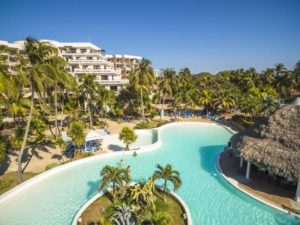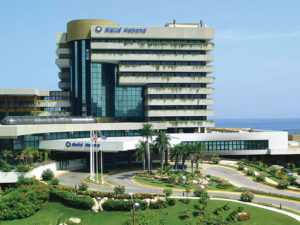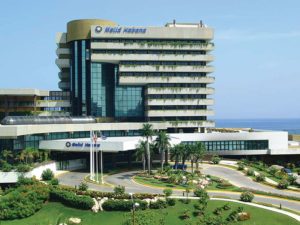
COMPAÑIA ESPAÑOLA MELIA GANA LA PRIMERA DEMANDA A CUBANOS EXILIADOS.
El Juzgado de Primera Instancia número 24 de Palma ha estimado la petición de la cadena Meliá Hotels International de archivar la demanda presentada por la familia de cubanos exiliados Sánchez Hill, que reclamaba diez millones de euros a la empresa mallorquina por la explotación de dos hoteles ubicados en una finca expropiada al clan por el régimen de Fidel Castro.
El juzgado ha aceptado la declinatoria planteada por Meliá Hotels International al considerar que existe una falta de jurisdicción y de competencia internacional de los tribunales españoles para actuar en la demanda contra el grupo hotelero. En un auto dictado fechado el lunes y comunicado a las partes este martes, la juez ha decretado el sobreseimiento de las actuaciones y ha condenado a los demandantes al pago de las costas, aunque la decisión puede ser recurrida ante la Audiencia Provincial.
La familia de exiliados cubanos Sánchez Hill había acusado a Meliá de enriquecerse con la explotación de los hoteles Paradisus Río de Oro y Sol Río de Luna y Mares, situados en la zona de Playa Esmeralda, al noroeste de Cuba, debido a que los dos resorts de lujo se construyeron en los terrenos de una antigua hacienda azucarera que perteneció a la familia hasta 1960.
En su demanda, los descendientes de la familia acusaban a Meliá de obtener un enriquecimiento con causa ilícita durante todo el tiempo que ha durado la actividad hotelera en los terrenos, y pedían que éstos fueran considerados como frutos derivados de una posesión ejercitada con mala fe. Reclamaban una cantidad equivalente a los beneficios económicos obtenidos durante los últimos cinco años. La demanda fue presentada en los juzgados de Palma porque es la ciudad en la que la cadena hotelera tiene fijada su sede.
En un auto, la juez de Palma acepta los argumentos de Meliá Hotels International, que alegó que los juzgados de Mallorca no tienen competencia para pronunciarse sobre la demanda, que calificaron de “ejercicio esquizofrénico” y “sinsentido procesal”. La juez recuerda que, tras la revolución de 1959, Fidel Castro decretó la nacionalización de todos los bienes y empresas de personas naturales o jurídicas de nacionalidad cubana o constituidas de acuerdo con la ley cubana mediante la aprobación de la ley 890.
La aplicación de esta norma provocó para los demandantes que el Estado cubano, de manera ilegítima según el derecho internacional, confiscase los terrenos propiedad de Santa Lucía Company y Sánchez Hermanos y a partir de ese momento pasaran a ser propiedad de Cuba. Así, Meliá Hotels “aprovechándose conscientemente de este acto”, obtuvo del Estado cubano una autorización para gestionar y explotar los terrenos situados en Playa Esmeralda y que actualmente son propiedad de Gaviota SA, una sociedad estatal. Por eso la demanda se dirigía contra una persona jurídica privada domiciliada en Mallorca que ha obtenido una autorización para la explotación de los terrenos de Gaviota SA.
“Resulta que el fundamento principal de las pretensiones de la parte actora no son los negocios jurídicos concretos que hayan podido concertar Meliá y Gaviota o sus relaciones mercantiles”, responde la magistrada, que apunta que el “verdadero fundamento” de la reclamación es la declaración de ilicitud de título de propiedad que Cuba ostenta sobre los terrenos de Playa Esmeralda, donde Meliá explota dos hoteles, y la responsabilidad en la que haya podido incurrir la cadena por lucrarse de los terrenos.
Para la juez las pretensiones de la familia Sánchez Hill se fundamentan en la valoración jurídica de actos realizados por un sujeto protegido por la inmunidad de jurisdicción, como es Cuba, en el marco de su soberanía. Según esto, los tribunales civiles españoles “no tienen jurisdicción para poder instruir la demanda que ha dado lugar al pleito”. “España no tiene competencia internacional para que sus tribunales resuelvan casos en los que se ejerciten acciones reales sobre bienes inmuebles situados fuera de su territorio nacional” concluye.
La hotelera mallorquina sospechaba que este pleito de la familia Sánchez Hill era el paso previo a una reclamación en Estados Unidos amparada por la ley Helms-Burton, que permite a particulares y empresas del país reclamar una indemnización por los bienes que les fueron confiscados durante el castrismo. Las cadenas hoteleras mallorquinas Meliá e Iberostar son las dos más afectadas por el endurecimiento del embargo al país caribeño por parte del gobierno de Donald Trump, ya que son las que más complejos explotan en Cuba. Meliá cuenta con 32 hoteles en la isla que ofrecen 15.000 habitaciones y está en proceso de construcción de otros siete. Iberostar cuenta con 21 establecimientos y cerca de 6.500 habitaciones, una cifra que pretenden doblar para 2020.
La ley Helms-Burton abrió la puerta a una cascada de demandas por la confiscación de bienes en Cuba. El pasado mes de mayo, la familia Mata presentó en la corte federal del distrito sur de Florida una demanda colectiva contra varias empresas turísticas del Gobierno de la isla, en la que reclamaron una indemnización millonaria por el uso del hotel San Carlos, ahora explotado por Meliá y otra cadena cubana. El complejo fue expropiado a la familia en 1962 y ahora los descendientes exigen una indemnización por esta confiscación. Meliá Hotels International no estaba incluida inicialmente en la demanda colectiva y fue notificada con un plazo de 30 días para indemnizar a los demandantes y evitar el inicio del proceso judicial.
 SPANISH COMPANY MELIA WINS THE FIRST DEMAND AGAINST CUBAN EXILED.
SPANISH COMPANY MELIA WINS THE FIRST DEMAND AGAINST CUBAN EXILED.
The Court of First Instance number 24 of Palma has estimated the request of the Meliá Hotels International chain to file the claim filed by the family of exiled Cubans Sánchez Hill, who claimed ten million euros to the Mallorcan company for the operation of two hotels located in a farm expropriated from the clan by the regime of Fidel Castro.
The court has accepted the decree filed by Meliá Hotels International when considering that there is a lack of jurisdiction and international jurisdiction of the Spanish courts to act in the lawsuit against the hotel group. In a court order dated Monday and communicated to the parties on Tuesday, the judge has decreed the dismissal of the proceedings and has ordered the plaintiffs to pay the costs, although the decision can be appealed to the Provincial Court.
The family of Cuban exiles Sánchez Hill had accused Meliá of enriching himself with the exploitation of the Paradisus Río de Oro and Sol Río de Luna y Mares hotels, located in the Playa Esmeralda area, northwest of Cuba, because the two resorts Luxury were built on the grounds of an old sugar farm that belonged to the family until 1960.
In their lawsuit, the descendants of the family accused Meliá of obtaining an enrichment with illicit cause during all the time that the hotel activity has lasted in the lands, and asked that these be considered as fruits derived from a possession exercised in bad faith. They claimed an amount equivalent to the economic benefits obtained during the last five years. The lawsuit was filed in the courts of Palma because it is the city in which the hotel chain is based.
In a car, the judge of Palma accepts the arguments of Meliá Hotels International, which alleged that the courts of Mallorca do not have jurisdiction to rule on the lawsuit, which they described as “schizophrenic exercise” and “procedural nonsense.” The judge recalls that, after the 1959 revolution, Fidel Castro decreed the nationalization of all assets and businesses of natural or legal persons of Cuban nationality or constituted in accordance with Cuban law through the approval of Law 890.
The application of this norm caused the plaintiffs that the Cuban State, illegitimately under international law, confiscate the land owned by the Santa Lucía Company and Sánchez Hermanos and from then on they will become the property of Cuba. Thus, Meliá Hotels “taking advantage of this act consciously”, obtained an authorization from the Cuban State to manage and exploit the land located in Playa Esmeralda and which are currently owned by Gaviota SA, a state company. That is why the lawsuit was directed against a private legal entity domiciled in Mallorca that has obtained an authorization for the exploitation of the Gaviota SA land.
“It turns out that the main basis of the claims of the plaintiff is not the specific legal businesses that Meliá and Gaviota have been able to conclude or their commercial relations,” replies the magistrate, who points out that the “true basis” of the claim is the statement of illegality of title of property that Cuba holds on the grounds of Playa Esmeralda, where Meliá operates two hotels, and the responsibility that the chain may have incurred for profiting from the land.
For the judge, the claims of the Sánchez Hill family are based on the legal assessment of acts performed by a subject protected by the immunity of jurisdiction, such as Cuba, within the framework of their sovereignty. According to this, the Spanish civil courts “have no jurisdiction to instruct the lawsuit that has led to the lawsuit.” “Spain has no international jurisdiction for its courts to resolve cases in which real actions are exercised on real estate located outside its national territory,” he concludes.
The Mallorcan hotel company suspected that this lawsuit by the Sánchez Hill family was the previous step to a claim in the United States under the Helms-Burton law, which allows individuals and businesses in the country to claim compensation for the assets that were confiscated during the Castroism The Mallorcan hotel chains Meliá and Iberostar are the two most affected by the tightening of the embargo on the Caribbean country by the government of Donald Trump, since they are the most complex exploit in Cuba. Meliá has 32 hotels on the island that offer 15,000 rooms and is in the process of building another seven. Iberostar has 21 establishments and about 6,500 rooms, a figure that they intend to double by 2020.
The Helms-Burton law opened the door to a cascade of lawsuits for the confiscation of property in Cuba. Last May, the Mata family filed a class-action lawsuit against several tourist companies of the Government of the island in the federal court of the southern district of Florida, in which they claimed a millionaire compensation for the use of the San Carlos hotel, now exploited by Meliá and another Cuban chain. The complex was expropriated from the family in 1962 and now the descendants demand compensation for this confiscation. Meliá Hotels International was not initially included in the class action lawsuit and was notified with a period of 30 days to compensate the plaintiffs and prevent the initiation of the judicial process.
Agencies/ El Pais/ Lucia Bohórquez/ Internet Photos/ Excerpts/ Extractos/ Arnoldo Varona/ www.TheCubanhistory.com
THE CUBAN HISTORY, HOLLYWOOD.



 < SPANISH COMPANY MELIÁ Wins the First Demand Against Cubans Exiled.
< SPANISH COMPANY MELIÁ Wins the First Demand Against Cubans Exiled.





